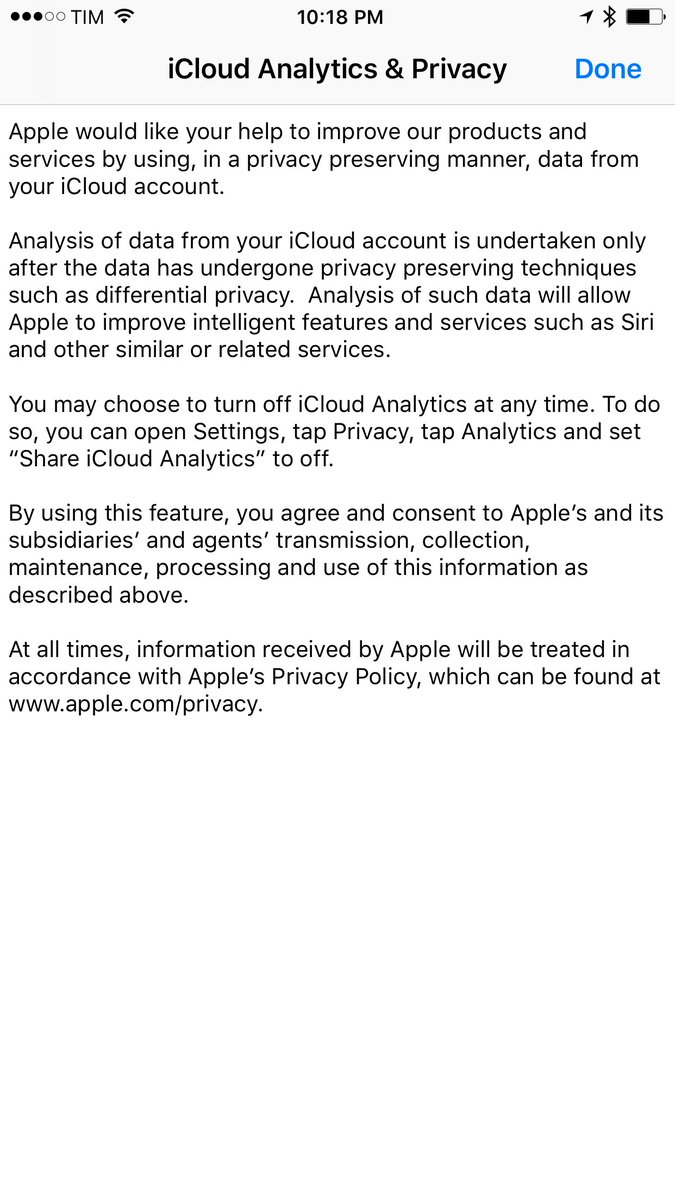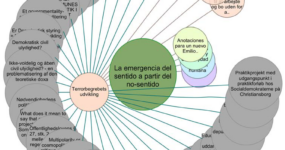

The next version of Apple’s mobile platform will include an opt-in for iOS users to share their iCloud data in order to help the company improve software products, such as its voice-powered virtual assistant, Siri. The iOS 10.3 beta was released earlier this week.
A note about the forthcoming change, under the heading “iCloud Analytics & Privacy”, says any user data shared with Apple via this opt in will undergo “privacy preserving techniques” — continuing its privacy-first approach to stepping up its AI efforts.

Follow
Federico Viticci
✔@viticci
One of the most interesting changes in 10.3 – Apple will use differential privacy on iCloud user data to improve services (opt-in)
2:56 AM – 25 Jan 2017
4747 Retweets
8181 likes
The company has generally lagged behind data-mining rivals such as Google in developing machine learning powered technologies and embedding them into its software and services to offer a more personalized and/or predictive experience, in no small part because it has prioritized (and championed) user privacy — meaning, unlike its major rivals, Apple does not routinely suck up users’ personal data in the clear.
And while that’s great from a privacy stand point — and allows Apple to differentiate its hardware business from rivals such as Google that do rely on factory-farming user data to power their ad-targeting business models — the company has been facing increasing competitive pressure from rivals when it comes to developing software that makes use of machine learning and AI to offer a more personalized experience to users.
With hardware sales growth slowing there’s also increasing pressure on Cupertino to innovate in services, which means it needs to be offering smarter, predictive and personalized products powered by machine learning. The problem is for AI to function it needs to be fed on data.
Apple’s workaround for what some have argued is a convenience vs privacy impasse is to apply a level of obfuscation to the raw user data, in order to protect individuals’ privacy, only taking this fuzzier data off to its cloud for analyzing (in bulk) to enable it to draw some broad-brush conclusions about usage trends.
Apple discussed one obfuscation technique it’s using — called differential privacy — back in June at WWDC, and says now this is one of the ways it will be processing any iCloud user-data that it gains access to after iOS 10.3.
At WWDC, Apple senior VP of software engineering Craig Federighi described the result of the algorithmic scrambling technique as akin to “crowdsourced learning”. Although it’s not clear how successful it’s been thus far — in terms of making a noticeable difference to the convenience and ‘delight’ of Apple services for its users.
We’ve reached out to the company with questions about the forthcoming expansion of its AI efforts and will update this post with any additional detail.
The first Apple services to gain AI-powered enhancements via the application of differential privacy techniques were: iMessage, with keyboard data used to power features such as next word and emoji predictions, and also flag up linguistic changes such as rising slang terms or trendy new words; Spotlight Search, with analytics on bulk user data enabling Apple to flag popular deep link searches to better rank search results; and Notes, where the technique has enabled more interactivity, such as underlining actionable info such as dates — to power things like calendar event creation suggestions. These were also the first three services it targeted to be a source of user data to apply its AI algorithms to.
In iOS 10.3 Apple is aiming to expand its access to user data via its cloud storage and back-up service, iCloud, though not (at least explicitly) to improve iCloud itself — rather it says it will be using insights gleaned there to help it improve its Siri voice assistant (among other unnamed services). It notes that users can opt out of sharing their iCloud data at any time — a welcome and sensible check, not least because some iCloud users do pay for extra storage.
With Siri, Apple is likely hoping that bulk iCloud data analysis can help it improve voice recognition capabilities — and perhaps also enhance the results served up by the voice assistant, by improving Siri’s ability to make selections/suggestions based on popular user queries.
While Apple was an early mover in the voice assistant space when it originally launched Siri, it’s now very fiercely contested territory, with all major tech giants having an offering — and analysts spying increasing user appetite for voice-driven offerings. Having access to good data is clearly key to improving AI assistant smarts.
iCloud users can sync all sorts of data to Apple’s cloud storage service — from their calendar, email, notes, reminders, photos and contacts, to Safari bookmarks and even choose to back up messaging content from apps such as WhatsApp — so there’s a very wide range of data and data types Apple could draw on here to try to make Siri (and other services) smarter.
While other tech companies have been experimenting with, and even applying, differential privacy techniques — including Google, via its RAPPOR project — Apple’s push on this front appears to be considerably broader.
“It is probably fair to say that Apple is the first to integrate differentially private algorithms so comprehensively into their products and to use it as a differentiator,” is how Adam Smith, a long time researcher in the field and associate professor in the Computer Science and Engineering Department at Pennsylvania State University, described the companies efforts back in June.
“I would imagine they will want to use the [iCloud] data for all sorts of things, from improving Siri suggestions to devising which new products to deploy and even much more technical things like what type of data compression to use,” Smith says now. “Basically, the more information they have about how people use their service, the better they can adapt it to accomplish particular goals (serve their customers, extract revenue, etc).”
Today it was also confirmed Apple has formally joined a raft of other tech firms in signing up to an AI research partnership that aims to help further socially beneficial artificial intelligence, likely by conducting research into areas such as AI ethics — a topic which is attracting increasing attention as autonomous technologies proliferate.
[“source-ndtv”]
Related Post
| M | T | W | T | F | S | S |
|---|---|---|---|---|---|---|
| 1 | 2 | 3 | 4 | 5 | 6 | |
| 7 | 8 | 9 | 10 | 11 | 12 | 13 |
| 14 | 15 | 16 | 17 | 18 | 19 | 20 |
| 21 | 22 | 23 | 24 | 25 | 26 | 27 |
| 28 | 29 | 30 | 31 | |||



























